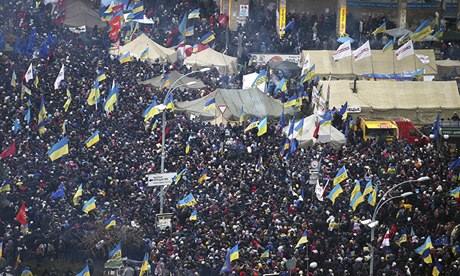Hundreds of thousands of Ukranians braved freezing temperatures and aggressive policing to return to central Kiev on Sunday to demand political change, sending a strong message to authorities that the crisis over the government's failure to sign an EU integration pact is not likely to end soon..
With the news that the EU has suspended negotiations on the agreement likely to further inflame the mood, at least 200,000 people packed into Independence Square, known as the maidan, to hear music and speeches from the trio of Ukrainian politicians who have attempted to lead the spontaneous outpouring of anger.
 They were joined early in the afternoon by US senator John McCain, the Republican politician who has made a sport of baiting Vladimir Putin at various locations across the former Soviet Union.
They were joined early in the afternoon by US senator John McCain, the Republican politician who has made a sport of baiting Vladimir Putin at various locations across the former Soviet Union.
"The destiny you seek likes in Europe," McCain told the crowd, to rapturous applause. "People of Ukraine, this is your moment. The freeworld is with you, America is with you, I am with you."
McCain was joined by Democrat Chris Murphy, who told the crowds they are making history on the maidan. "If you are successful, the US Senate will stand with you all the way," he said, in comments likely to infuriate Moscow, which has accused Europe and the west of interfering in Ukrainian politics.
Yanukovych and his government have given extremely mixed signals on whether they want to sign the agreement. The president has said on several occasions that the country is still on the path to European integration. However, the prime minister, Mykola Azarov, said on the weekend that establishing closer ties with Russia was the way forward.
"We understood that signing this agreement [with the EU] would mean bankrupting us," he said on Saturday. "We need to restore trade with theRussian Federation."
Yanukovych travels to Moscow to meet Putin on Tuesday, and the opposition fear he may sign up to the Customs Union, a trade grouping which the Kremlin is keen to bolster with the addition of Ukraine.
Arseniy Yatsenyuk, leader of jailed former prime minister Yulia Tymoshenko's Fatherland party, told the crowds that if Yanukovych signs the agreement in Moscow, he should never return to Kiev.
"What is happening on the maidan today? It is an anti-colonial revolution," said former interior minister Yuriy Lutsenko from the stage. "Above all, Ukrainians turned out to say to Moscow: 'We are no longer under your command, we are an independent country.'"
A rival protest rally organised by the government to show that the maidan is not representative of all Ukraine turned out to be a damp squib,despite the presence of tens of thousands of people bussed in from the east and south of the country.
Several dozen military tents and field kitchens were set up in a park near the parliament, offering hot food and tea to those taking part, many of whom brandished the blue flags of Yanukovych's Party of Regions. But their weary demeanour and eagerness to leave for home after a few hours was in striking contrast with the positive mood on the maidan.
The majority of those present were employees of state-owned enterprises, who were shipped into the capital on specially chartered trains or buses organised by Yanukovych's party. Many of them admitted privately that they had been paid to attend.
Nevertheless, some were sincerely disturbed by events on the maidan. "Their maidan could lead to a civil war, and we do not need that," said Mikhailo Karavayev, a 20-year-old businessman from Zaporizhia in eastern Ukraine.
"It's impossible that these people are just not working for a month, the country needs to work," said Alla Kravchenko, 59, who had come for the day by chartered bus and was dancing with a Party of Regions flag. She said that the conflict should be solved by negotiations and not by street power. "We are one country, and nobody should be allowed to split us up."
With the often changing demands of the opposition leaders, the surprising durability of the maidan protest, and the unpredictability of Yanukovych's decision making, few are brave enough to make firm predictions about how the standoff will end.
Political analyst Volodymyr Fesenko says there are three potential scenarios. In the first, the authorities could stick it out to new year, and hope the maidan dissolves of its own accord during the holiday season.
The second option would be a renewed attempt to disperse the protests by force: "The 'force' wing among Yanukovych's inner circle remains very active … The maidan is an irritant to Yanukovych and I'm not sure he wants to bear it for several more weeks."
However, any move against the maidan would involve heavy as the square is aggressively defended. Thousands of riot police spent several hours dismantling barricades in an edgy standoff in the early hours of Wednesday, but later retreated, and protesters rebuilt the barricades twice as high.
The final option is a compromise solution involving the sacking of the interior minister or the prime minister. "If a neutral government of technocrats is formed instead of the current one, it could relieve tensions and calm people down," said the analyst.
Oleksandr Volkov, an MP from the Party of Regions, told the Guardianthat parliament should meet to solve the crisis in the coming week.
"Some people have already been punished," he said, referring to the mayor of Kiev and Yanukovych's deputy security chief, who have been suspended pending an investigation into violence against protesters on 30 November that lead to the protest snowballing. "We will also punish some more people," he added, and even held out the possibility that Azarov could be fired.
No comments:
Post a Comment